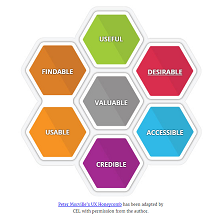
Description: What does it mean to take an evidence-based approach to online course design? “Evidence” in instructional design typically refers to the pedagogical and design principles that arise from the educational literature. However, if our goal as online course designers is to create valuable learning experiences for students, shouldn’t the empirical examination of student perspectives form part of the evidence we use to inform the design process?
Even if we think this kind of input is a good idea, how can we routinely incorporate student experiences in a manner that enhances learning? This is where a User Experience (UX) perspective can help, first by focusing design efforts on creating value for users, and secondly by providing a set of tools to systematically capture user perspectives.
The Centre for Extended Learning (CEL) has recently taken up the challenge of systematically incorporating student perspectives into our design processes. We’ve started by adopting a tried, tested, and widely referenced UX framework developed by Peter Morville (the UX Honeycomb), which we’ve adapted for a teaching and learning context, incorporating the work of leading UX specialists and cognitive psychologists. We call our framework the User Experience Design for Learning (UXDL) Honeycomb. The UXDL Honeycomb is a cohesive set of guidelines to help online course designers, developers, and authors begin to integrate student perspectives into the design process with the goal of creating valuable learning experiences.
Join us as we explore the UXDL honeycomb together, and don the mantle of instructional designer as we use the honeycomb to resolve specific course design challenges.
Learning Outcomes: After the session, participants will be able to:
- recognize user experience (UX) as an important part of the course design process;
- identify the tools and strategies available to integrate student perspectives into course design;
- apply well-established UX principles to course design challenges.
Facilitators: Matt Justice (CEL) and Pia Zeni (CEL)
Help with registration.
Full overview of 2017 Educational Technologies workshop series.